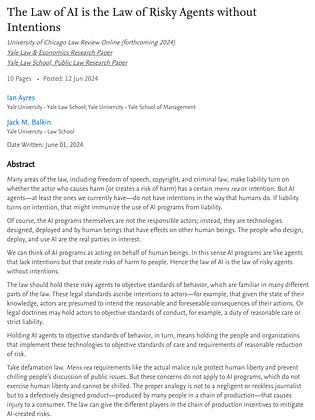Note
The app for independent voices

The new Times expose on Ukraine is shocking, horrifying, enraging. Everyone involved with this caper needs to be sent up the river

You made it, you own it
You always own your intellectual property, mailing list, and subscriber payments. With full editorial control and no gatekeepers, you can do the work you most believe in.


Great discussions
Join the most interesting and insightful discussions.

It’s a big day at The Free Press.
Tyler Cowen, Jed Rubenfeld, Matthew Continetti, Batya Ungar-Sargon become columnists. And Coleman Hughes brings his podcast to our shop.

🚨 Fascinating AI paper alert: Yan Ayres & Jack M. Balkin publish "The Law of AI is the Law of Risky Agents without Intentions." A must-read for everyone in AI. Quotes:
"A recurrent problem in adapting law to artificial intelligence programs is how the law should regulate the use of entitles that lack intentions. Many areas of the law, including freedom ofspeech, copyright, and criminal law, make liability turn on whether the actor who causes harm(or creates a risk of harm) has a certain intention or mens rea. But AI agents—at least the oneswe currently have—do not have intentions in the way that humans do. If liability turns on intention, that might immunize the use of AI programs from liability." (page 1)
-
"The two strategies of ascribing intention and imposing standards of behavior based on an imagined intention are mirror images of each other. The first strategy says 'regardless of your intentions, the law will treat you as if you had a particular intention and regulate or penalize you accordingly.' The second strategy says 'regardless of your actual intentions, the law will measure your conduct by the standard of a hypothetical person with a particular mental state and regulate or penalize you if you do not live up to that standard.' We propose that the law regulate the use of AI programs through these two strategies. (...)" (page 3)
-
"The spread of AI technology will likely require changes in many different areas of the law. In this essay we’ve argued for viewing AI technology not in terms of its independent agency but in terms of the people and companies that design, deploy, offer and use the technology. To properly regulate AI, we need to keep our focus on the human beings behind it." (page 10)
➡ Read the full paper below.
➡ Never miss my AI policy, regulation, and excellent papers updates: subscribe to my weekly newsletter.

































